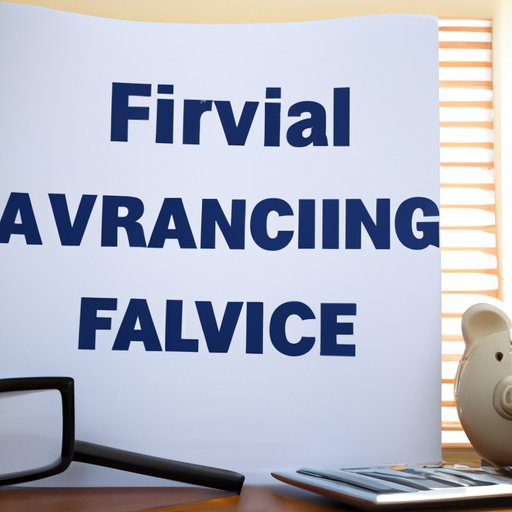Introduction
Financial advisors are experts in their field who provide advice and guidance to individuals and businesses on how to manage their money. They help clients make informed decisions about investments, debt management, retirement planning, and other important financial topics. Becoming a financial advisor is a rewarding career choice that requires specialized knowledge and expertise.
This guide will explore the qualifications, certifications, and licenses necessary for becoming a financial advisor as well as the skills and networks you need to develop to succeed in the profession. By following these steps, you can become a successful financial advisor.

Research the Qualifications for Becoming a Financial Advisor
The first step in becoming a financial advisor is researching the qualifications and requirements in your area. Each state has different regulations and requirements for financial advisors, so it’s important to be familiar with the laws and regulations in your jurisdiction.
Determine Regulatory Requirements in Your Area
To become a financial advisor, you must meet all of the regulatory requirements in your area. These may include educational requirements, licensing requirements, and background checks. You should also check with your state’s financial regulator to ensure that you meet any additional requirements they may have.
Understand Education and Experience Necessary for Certification
Most financial advisors are required to hold certain certifications or licenses. To obtain these certifications, you must typically have a college degree and several years of experience in the financial industry. It’s important to research the specific qualifications in your area to ensure that you meet all of the requirements.

Obtain Necessary Certifications and Licenses
Once you’ve determined the qualifications and certifications necessary for becoming a financial advisor, you can begin the process of obtaining them. This may involve taking exams, completing courses, and paying fees.
Examine Exam Requirements and Fees
Before you can sit for an exam, you must typically pay a fee. Additionally, some exams may require you to complete prerequisites or take additional courses. Be sure to research the exam requirements and fees before beginning the process.
Complete Required Courses
Depending on the certification or license you’re seeking, you may be required to complete certain courses. These courses may include classes in finance, economics, accounting, and law. Be sure to research the courses required for the certification or license you’re seeking.
Take Necessary Exams
Once you’ve completed the necessary courses and paid the required fees, you can take the exams necessary for certification or licensure. These exams may include the Series 7, Series 65, and Series 66 exams. Be sure to research the exams necessary for the certification or license you’re seeking.
Develop Your Skills Through Education and Training
In addition to obtaining certifications and licenses, you should also focus on developing your skills through education and training. This will help you become a more effective financial advisor and provide better service to your clients.
Utilize Professional Development Opportunities
There are many professional development opportunities available to financial advisors. These may include attending seminars and conferences, participating in webinars, and taking continuing education courses. Taking advantage of these opportunities will help you stay up to date on the latest trends and developments in the field.
Pursue Continuing Education
Continuing education is essential for financial advisors. It helps you stay informed on the latest regulations, laws, and best practices. Most states require financial advisors to complete a certain number of continuing education hours each year, so it’s important to keep track of these requirements.

Build Your Network and Establish Relationships
As a financial advisor, it’s important to build a strong network of contacts and establish relationships with other professionals in the industry. This will help you gain referrals, find new clients, and stay informed on the latest trends and developments in the field.
Join Professional Organizations
Joining professional organizations is an excellent way to build your network and establish relationships with other financial advisors. These organizations often offer educational resources, mentoring programs, and networking events. Joining one or more of these organizations can be invaluable to your career.
Attend Conferences and Networking Events
Attending conferences and networking events is another great way to build your network and develop relationships with other financial advisors. These events are often hosted by professional organizations and provide an opportunity to learn from experts in the field and meet other professionals in the industry.
Market Yourself and Your Services
Once you’ve established yourself as a financial advisor, you should begin marketing yourself and your services. This may include creating an online presence, developing a marketing strategy, and utilizing social media.
Create an Online Presence
Creating an online presence is essential for financial advisors. You should create a website and social media accounts to showcase your services and connect with potential clients. Additionally, you should consider creating blog posts and videos to share your knowledge and demonstrate your expertise.
Develop a Marketing Strategy
Developing a marketing strategy is an important part of building your business as a financial advisor. This may include utilizing search engine optimization (SEO), leveraging email campaigns, and creating targeted advertising campaigns. By creating a comprehensive marketing strategy, you can effectively reach potential clients.
Conclusion
Becoming a financial advisor involves meeting certain qualifications, obtaining certifications and licenses, developing skills, building relationships, and establishing a network. Researching the qualifications, understanding the necessary certifications and licenses, and pursuing continuing education are all important steps in the process. Additionally, building a network and marketing yourself and your services are key components of success. With dedication and hard work, you can become a successful financial advisor.
Being a financial advisor offers numerous benefits, including the chance to help people achieve their financial goals and the potential for a lucrative career. Following the steps outlined in this guide will help you become a successful financial advisor.
(Note: Is this article not meeting your expectations? Do you have knowledge or insights to share? Unlock new opportunities and expand your reach by joining our authors team. Click Registration to join us and share your expertise with our readers.)
